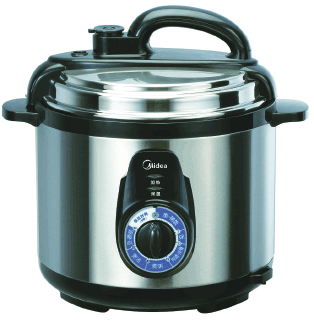Pressure cooking is the process of cooking food, using water or other cooking liquid, in a sealed vessel known as a pressure cooker. The cooker does not permit air or liquids to escape below a pre-set pressure. Used for cooking food quicker than conventional cooking methods, pressure cookers save energy.
Formation of pressure cooker
 Pressure cookers heat food quickly because the internal steam pressure from the boiling liquid causes wet steam to penetrate the food. Thus, higher temperature water vapour, which transfers heat faster than dry air, cooks food very quickly.
Pressure cookers heat food quickly because the internal steam pressure from the boiling liquid causes wet steam to penetrate the food. Thus, higher temperature water vapour, which transfers heat faster than dry air, cooks food very quickly.
Pressure cooking reduces the amount of energy used to cook a dish, as the water is not boiling for a long period; once the target temperature is reached, the only lost heat is through the surface of the pot or any venting that occurs. It is the most energy-efficient method of cooking.
Maximising pressure cooker use
Cooking under pressure requires less liquid than conventional cooking methods since there is less evaporation. You can always use more liquid than recommended in a pressure cooker recipe, but never use less.
Remember that pressure cookers cook quickly, since they use the pressure created from the built-up, hot, trapped steam in the pot.
Therefore:
-Always use at least one cup of cooking liquid.
-Never fill the pressure cooker more than half way liquid.
-If you end up with too much cooking liquid after cooking under pressure, simply reduce the liquid by bringing it to a boil uncovered and reduce until the desired consistency.
-Never over-fill the pressure cooker.
-Though steam does not weigh anything, it needs space in the pressure cooker to build up.
Therefore:
• Never fill it more than two-third full with food.
• Never fill it more thanhalf full with liquid.
Adjusting the heat
-The whole concept of pressure cookers is simple. Water or any cooking liquid comes to a boil at 2120F. Steam is hotter than boiling water and can reach approximately 2500F. Foods prepared in pressure cooker cooks by at least 25 per cent (if not more!) faster.
-Begin cooking under pressure over high heat.
-Once the pressure cooker comes up to pressure, lower the heat to a low burner setting, so that it maintains pressure without exceeding it.
-If cooking with electric, use two burners: one on high heat to get things going; the other on low to maintain pressure.
-If pressure appears to be dropping, raise the burner slightly.
-The key to cooking with a pressure cooker is timing. Timing is as important as developing pressure. Once you have reduced pressure according to the recipe directions, be sure to set a digital kitchen timer for the recommended cooking time.
Note: All cooking times are approximate and might be understated.
-It is always better to under-cook than over-cook food. If food needs to be cooked longer, do so in one to five minute intervals under pressure. The harder the food, the longer the additional time!
-For consistent results, cut foods into pieces of uniform size to promote even cooking.
-Large pieces of meat, etc., take considerably longer to cook than smaller pieces.
-When mixing foods, such as meat, potatoes and vegetables, begin by cooking the meat halfway; release pressure, then add the potatoes. Cook afterwards for two-third of their recommended cooking time, and at last add the vegetables.
Though the pressure cooker is best suited for preparing foods that require long cooking duration, you can cook almost anything in it.
-Prepare ingredients as called for in the conventional recipe.
Make sure you are using enough liquid to create steam (usually a about of one to two cups).
-Try to match the conventional recipe to a similar pressure cooker version, adjusting the ingredients and cooking time accordingly.
-Cut back on the cooking time at least 25 per cent, up to 50 per cent.
Remember, you can always go back and cook the food longer if need be, while overcooked mushy food cannot be saved!
Storage
The most convenient and best way to store your pressure cooker, after use, is to place the lid upside down, on top of the pot.
Before storing, always wash the pot, lid and rubber seal by hand with soapy, warm water; dry well before putting away.
Always check the safety valves to make sure they are clean and that the rubber seal is always flexible before inserting it under the lid.













